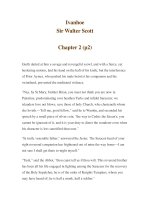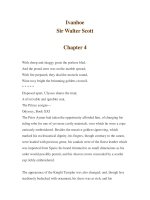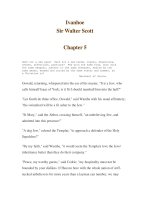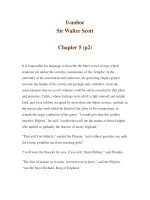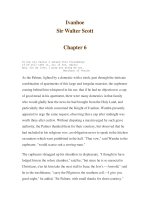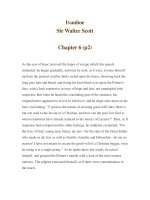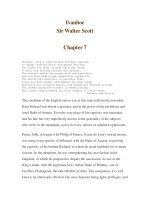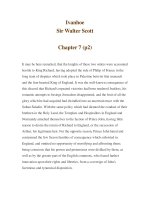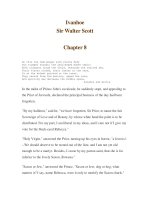Ivanhoe -Sir Walter Scott- Chapter 12 (p2) pps
Bạn đang xem bản rút gọn của tài liệu. Xem và tải ngay bản đầy đủ của tài liệu tại đây (22.3 KB, 8 trang )
Ivanhoe
Sir Walter Scott
Chapter 12 (p2)
Amid the varied fortunes of the combat, the eyes of all endeavoured to
discover the leaders of each band, who, mingling in the thick of the fight,
encouraged their companions both by voice and example. Both displayed
great feats of gallantry, nor did either Bois-Guilbert or the Disinherited
Knight find in the ranks opposed to them a champion who could be termed
their unquestioned match. They repeatedly endeavoured to single out each
other, spurred by mutual animosity, and aware that the fall of either leader
might be considered as decisive of victory. Such, however, was the crowd
and confusion, that, during the earlier part of the conflict, their efforts to
meet were unavailing, and they were repeatedly separated by the eagerness
of their followers, each of whom was anxious to win honour, by measuring
his strength against the leader of the opposite party.
But when the field became thin by the numbers on either side who had
yielded themselves vanquished, had been compelled to the extremity of the
lists, or been otherwise rendered incapable of continuing the strife, the
Templar and the Disinherited Knight at length encountered hand to hand,
with all the fury that mortal animosity, joined to rivalry of honour, could
inspire. Such was the address of each in parrying and striking, that the
spectators broke forth into a unanimous and involuntary shout, expressive of
their delight and admiration.
But at this moment the party of the Disinherited Knight had the worst; the
gigantic arm of Front-de-Boeuf on the one flank, and the ponderous strength
of Athelstane on the other, bearing down and dispersing those immediately
exposed to them. Finding themselves freed from their immediate
antagonists, it seems to have occurred to both these knights at the same
instant, that they would render the most decisive advantage to their party, by
aiding the Templar in his contest with his rival. Turning their horses,
therefore, at the same moment, the Norman spurred against the Disinherited
Knight on the one side, and the Saxon on the other. It was utterly impossible
that the object of this unequal and unexpected assault could have sustained
it, had he not been warned by a general cry from the spectators, who could
not but take interest in one exposed to such disadvantage.
"Beware! beware! Sir Disinherited!" was shouted so universally, that the
knight became aware of his danger; and, striking a full blow at the Templar,
he reined back his steed in the same moment, so as to escape the charge of
Athelstane and Front-de-Boeuf. These knights, therefore, their aim being
thus eluded, rushed from opposite sides betwixt the object of their attack and
the Templar, almost running their horses against each other ere they could
stop their career. Recovering their horses however, and wheeling them
round, the whole three pursued their united purpose of bearing to the earth
the Disinherited Knight.
Nothing could have saved him, except the remarkable strength and activity
of the noble horse which he had won on the preceding day.
This stood him in the more stead, as the horse of Bois-Guilbert was
wounded, and those of Front-de-Boeuf and Athelstane were both tired with
the weight of their gigantic masters, clad in complete armour, and with the
preceding exertions of the day. The masterly horsemanship of the
Disinherited Knight, and the activity of the noble animal which he mounted,
enabled him for a few minutes to keep at sword's point his three antagonists,
turning and wheeling with the agility of a hawk upon the wing, keeping his
enemies as far separate as he could, and rushing now against the one, now
against the other, dealing sweeping blows with his sword, without waiting to
receive those which were aimed at him in return.
But although the lists rang with the applauses of his dexterity, it was evident
that he must at last be overpowered; and the nobles around Prince John
implored him with one voice to throw down his warder, and to save so brave
a knight from the disgrace of being overcome by odds.
"Not I, by the light of Heaven!" answered Prince John; "this same springald,
who conceals his name, and despises our proffered hospitality, hath already
gained one prize, and may now afford to let others have their turn." As he
spoke thus, an unexpected incident changed the fortune of the day.
There was among the ranks of the Disinherited Knight a champion in black
armour, mounted on a black horse, large of size, tall, and to all appearance
powerful and strong, like the rider by whom he was mounted, This knight,
who bore on his shield no device of any kind, had hitherto evinced very little
interest in the event of the fight, beating off with seeming ease those
combatants who attacked him, but neither pursuing his advantages, nor
himself assailing any one. In short, he had hitherto acted the part rather of a
spectator than of a party in the tournament, a circumstance which procured
him among the spectators the name of "Le Noir Faineant", or the Black
Sluggard.
At once this knight seemed to throw aside his apathy, when he discovered
the leader of his party so hard bestead; for, setting spurs to his horse, which
was quite fresh, he came to his assistance like a thunderbolt, exclaiming, in a
voice like a trumpet-call, "Desdichado, to the rescue!" It was high time; for,
while the Disinherited Knight was pressing upon the Templar, Front-de-
Boeuf had got nigh to him with his uplifted sword; but ere the blow could
descend, the Sable Knight dealt a stroke on his head, which, glancing from
the polished helmet, lighted with violence scarcely abated on the "chamfron"
of the steed, and Front-de-Boeuf rolled on the ground, both horse and man
equally stunned by the fury of the blow. "Le Noir Faineant" then turned his
horse upon Athelstane of Coningsburgh; and his own sword having been
broken in his encounter with Front-de-Boeuf, he wrenched from the hand of
the bulky Saxon the battle-axe which he wielded, and, like one familiar with
the use of the weapon, bestowed him such a blow upon the crest, that
Athelstane also lay senseless on the field. Having achieved this double feat,
for which he was the more highly applauded that it was totally unexpected
from him, the knight seemed to resume the sluggishness of his character,
returning calmly to the northern extremity of the lists, leaving his leader to
cope as he best could with Brian de Bois-Guilbert. This was no longer
matter of so much difficulty as formerly. The Templars horse had bled
much, and gave way under the shock of the Disinherited Knight's charge.
Brian de Bois-Guilbert rolled on the field, encumbered with the stirrup, from
which he was unable to draw his foot. His antagonist sprung from
horseback, waved his fatal sword over the head of his adversary, and
commanded him to yield himself; when Prince John, more moved by the
Templars dangerous situation than he had been by that of his rival, saved
him the mortification of confessing himself vanquished, by casting down his
warder, and putting an end to the conflict.
It was, indeed, only the relics and embers of the fight which continued to
burn; for of the few knights who still continued in the lists, the greater part
had, by tacit consent, forborne the conflict for some time, leaving it to be
determined by the strife of the leaders.
The squires, who had found it a matter of danger and difficulty to attend
their masters during the engagement, now thronged into the lists to pay their
dutiful attendance to the wounded, who were removed with the utmost care
and attention to the neighbouring pavilions, or to the quarters prepared for
them in the adjoining village.
Thus ended the memorable field of Ashby-de-la-Zouche, one of the most
gallantly contested tournaments of that age; for although only four knights,
including one who was smothered by the heat of his armour, had died upon
the field, yet upwards of thirty were desperately wounded, four or five of
whom never recovered. Several more were disabled for life; and those who
escaped best carried the marks of the conflict to the grave with them. Hence
it is always mentioned in the old records, as the Gentle and Joyous Passage
of Arms of Ashby.
It being now the duty of Prince John to name the knight who had done best,
he determined that the honour of the day remained with the knight whom the
popular voice had termed "Le Noir Faineant." It was pointed out to the
Prince, in impeachment of this decree, that the victory had been in fact won
by the Disinherited Knight, who, in the course of the day, had overcome six
champions with his own hand, and who had finally unhorsed and struck
down the leader of the opposite party. But Prince John adhered to his own
opinion, on the ground that the Disinherited Knight and his party had lost the
day, but for the powerful assistance of the Knight of the Black Armour, to
whom, therefore, he persisted in awarding the prize.
To the surprise of all present, however, the knight thus preferred was
nowhere to be found. He had left the lists immediately when the conflict
ceased, and had been observed by some spectators to move down one of the
forest glades with the same slow pace and listless and indifferent manner
which had procured him the epithet of the Black Sluggard. After he had been
summoned twice by sound of trumpet, and proclamation of the heralds, it
became necessary to name another to receive the honours which had been
assigned to him. Prince John had now no further excuse for resisting the
claim of the Disinherited Knight, whom, therefore, he named the champion
of the day.
Through a field slippery with blood, and encumbered with broken armour
and the bodies of slain and wounded horses, the marshals of the lists again
conducted the victor to the foot of Prince John's throne.
"Disinherited Knight," said Prince John, "since by that title only you will
consent to be known to us, we a second time award to you the honours of
this tournament, and announce to you your right to claim and receive from
the hands of the Queen of Love and Beauty, the Chaplet of Honour which
your valour has justly deserved." The Knight bowed low and gracefully, but
returned no answer.
While the trumpets sounded, while the heralds strained their voices in
proclaiming honour to the brave and glory to the victor while ladies
waved their silken kerchiefs and embroidered veils, and while all ranks
joined in a clamorous shout of exultation, the marshals conducted the
Disinherited Knight across the lists to the foot of that throne of honour
which was occupied by the Lady Rowena.
On the lower step of this throne the champion was made to kneel down.
Indeed his whole action since the fight had ended, seemed rather to have
been upon the impulse of those around him than from his own free will; and
it was observed that he tottered as they guided him the second time across
the lists. Rowena, descending from her station with a graceful and dignified
step, was about to place the chaplet which she held in her hand upon the
helmet of the champion, when the marshals exclaimed with one voice, "It
must not be thus his head must be bare." The knight muttered faintly a few
words, which were lost in the hollow of his helmet, but their purport seemed
to be a desire that his casque might not be removed.
Whether from love of form, or from curiosity, the marshals paid no attention
to his expressions of reluctance, but unhelmed him by cutting the laces of his
casque, and undoing the fastening of his gorget. When the helmet was
removed, the well-formed, yet sun-burnt features of a young man of twenty-
five were seen, amidst a profusion of short fair hair. His countenance was as
pale as death, and marked in one or two places with streaks of blood.
Rowena had no sooner beheld him than she uttered a faint shriek; but at once
summoning up the energy of her disposition, and compelling herself, as it
were, to proceed, while her frame yet trembled with the violence of sudden
emotion, she placed upon the drooping head of the victor the splendid
chaplet which was the destined reward of the day, and pronounced, in a clear
and distinct tone, these words: "I bestow on thee this chaplet, Sir Knight, as
the meed of valour assigned to this day's victor:" Here she paused a moment,
and then firmly added, "And upon brows more worthy could a wreath of
chivalry never be placed!"
The knight stooped his head, and kissed the hand of the lovely Sovereign by
whom his valour had been rewarded; and then, sinking yet farther forward,
lay prostrate at her feet.
There was a general consternation. Cedric, who had been struck mute by the
sudden appearance of his banished son, now rushed forward, as if to separate
him from Rowena. But this had been already accomplished by the marshals
of the field, who, guessing the cause of Ivanhoe's swoon, had hastened to
undo his armour, and found that the head of a lance had penetrated his
breastplate, and inflicted a wound in his side.

